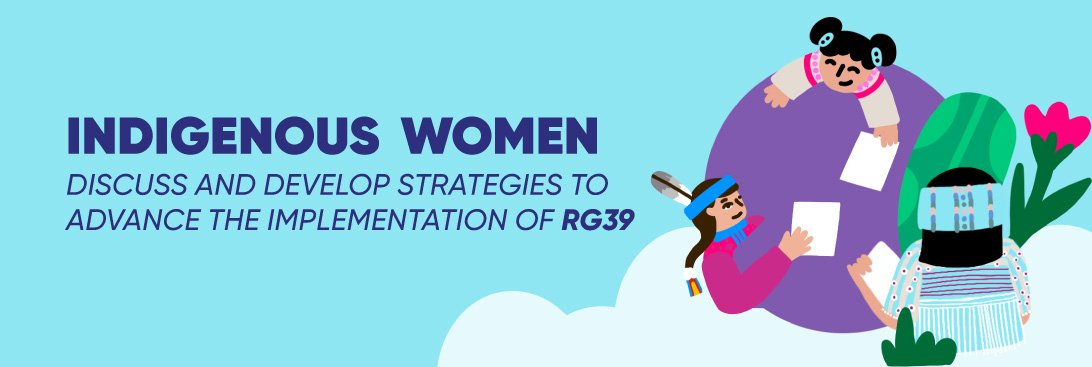
April 17, 2023.- In a parallel event to the 22nd session of the United Nations Permanent Forum on Indigenous Issues (UNPFII) at the UN headquarters in New York, Indigenous Peoples Rights International (IPRI), the UN Voluntary Fund for Indigenous Peoples, the Inuit Circumpolar Council (ICC), The Christensen Fund, The Institute for the Study of Human Rights at Columbia University, the Abya Yala Indigenous Forum, and the International Indigenous Women’s Forum (FIMI) came together to keep moving forward in the implementation of CEDAW’s General Recommendation number 39 (RG39), a historic achievement for Indigenous Girls and Women around the world, considering the multiple forms of discrimination we face.
The UNPFII is an advisory body that promotes the respect and full application of the United Nations Declaration on the Rights of Indigenous Peoples. In this occasion, it was a key bridge for international institutions, UN agencies and Indigenous Organizations to meet in order to continue advancing in the implementation of RG39, a legally binding human rights instrument that contemplates the different dimensions of discrimination suffered by Indigenous Women, both as women and as Indigenous People.
During the meeting’s introduction, Joan Carling, Kankana-ey Igorot activist from the Philippines and IPRI’s Executive Director, explained that the Recommendation addresses the individual and collective rights of Indigenous Women, “specifically the issues and concerns of Indigenous Women defenders, recognizing the risks and various forms of attacks that loom over them when they carry out their daily activities, seeking access to and control over their lands and natural resources”. She added that the implementation is important in that it calls on the States to guarantee that the rights defenders are not criminalized or made the target of reprisals for their work.
Tarcila Rivera Zea, Quechua woman from Peru and FIMI’s President, warned that the actual implementation of the Recommendation faces great challenges: “we must help our own organizations understand that the implementation not only benefits girls and women, but that the Indigenous Peoples as a whole can use it to push for a national policy that directly serves the communities”.
In her opening address, Arhuaca leader Leonor Zalabata Torres, Colombian ambassador to the United Nations, affirmed that “social participation in the States’ decisions plays an important role for peace, the sustainable development of the Earth, and the brotherhood and solidarity of the Peoples”. CEDAW’s Recommendation Number 39, she added, “allows us to decide how we want to live our cultures, in consensus and in unity with our realities”. Indigenous Women “have had a relevant role in this because we have been able to guarantee and preserve our ancestral wisdom and, with it, the permanence of the First Peoples”.
Gladys Acosta, former president of the CEDAW Committee, commented that “at a time when the dynamics of death seem to want to prevail, RG39 is a broad reflection on the rules of life and their prevalence”. She assured that “what we have achieved with the Recommendation, working with Indigenous Women and Organizations, is to respectfully collect the worldview, the spirituality of the Peoples and to recognize the deep connection between their rights and the communities’ territories and natural resources”. General Recommendation Number 39 “is a tool to use in our fight”, she said.
“It insists on the obligation of the member States to provide access to education, health and political participation inside and outside the communities, urging them to take measures against gender violence, including those perpetrated by the State or associated organizations,” she warned.
Nukila Evanty, Executive Director of the Women Working Group (WWG), and Rosalee González, Co-Coordinator of the Northern Region of the Enlace Continental de Mujeres Indígenas de las Américas (ECMIA), agreed that structural racism aggravated by gender discrimination continues to be a daily reality for the Indigenous Girls and Women of the world. RG39 “responds to a permanent call from the First Peoples to create a specific instrument to promote and protect our rights. It represents a growing movement for greater inclusion while preserving the cultural identity of our peoples,” said González.
The Assistant Secretary-General of the United Nations and Deputy Executive Director of UN Women, Åsa Regnér, recognized the valuable partnerships that Indigenous Organizations and Women established to achieve this strategic recommendation, noting that it is important that we all continue working on its implementation. “There is evidence that Indigenous Girls and Women are three times more likely to suffer violence than their non-indigenous counterparts. Indigenous Women defenders are even killed for protecting the rights of other women, and yet these attacks seldom make it to the headlines in the news.” “The actions that we promote, she said, should help make visible the degree of violence that is really experienced.”
Sara Olsvig, International President of the Inuit Circumpolar Council (ICC), recalled when the Danish government forced the implantation of contraceptive devices on women to reduce the birth rate in Greenland. “Between 1966 and 1975, some 4,500 Inuit girls and women received an intrauterine device (IUD), often without their knowledge,” she explained. This forced family planning project violated the health of women who suffered pain, infections and difficulties getting pregnant for several years after, she said. “The recommendation that we have in our hands can help us make sure that such shameful violations of women’s bodies never happen again,” she added.
Concluding the event, Puyr Tembé, president of the Federação Estadual dos Povos Indígenas do Pará (FEPIPA), explained that despite this Brazilian Indigenous Women’s organization being relatively young, “we have managed to strengthen and multiply our voices by occupying institutional spaces that help us to create public policies that are better aligned with our needs and interests”.
“We have made significant progress in the formal recognition of our rights from within the government, and General Recommendation Number 39 is a relevant tool that recognizes us as Indigenous Women agents of change, inside and outside our communities, allowing us to reach for the full exercise of our political rights,” she concluded.




